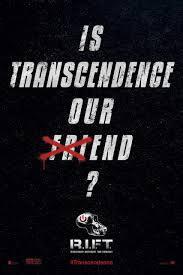 Since I believe Artificial Intelligence (AI) looms hugely in our future – I had to see Transcendence, the latest AI movie. It’s a lot darker than the last one, Her. (See my review.)
Since I believe Artificial Intelligence (AI) looms hugely in our future – I had to see Transcendence, the latest AI movie. It’s a lot darker than the last one, Her. (See my review.)
Will (Johnny Depp) and Evelyn (Rebecca Hall) are husband-and-wife AI scientists, who have created PINN, a computer-based intelligence with self-awareness (maybe). Max is another, who has succeeded in uploading a monkey’s mind to a computer (maybe).

RIFT shoots Will with a radioactive bullet; he has a month to live. So, they meld his and Evelyn’s work with Max’s, to upload Will’s mind to PINN before his body conks out. This is RIFT’s nightmare; they manage to destroy the PINN computer, but too late to stop Will from escaping out into the Internet – where he is now, well, everywhere. With access to all the information and data in the world.
This is the “Singularity” foreseen by Ray Kurzweil (and in my own famous Humanist magazine article), when AI vastly outstrips human intelligence, sending technological advancement into overdrive.

But RIFT sees all this as curtains for Humanity 1.0 – and ultimately manages to convince Max, the Morgan Freeman wise man scientist character, and finally Evelyn herself. Even the government is secretly on their side!
Nearing the end there is a lot of gunplay and blowing up stuff. Not exactly futuristic – the weaponry was vintage WWII.

In the end, of course, the “good guys” (who turn out to be the Luddite terrorists!) win. If you call it winning – it requires destroying the whole Internet – which in turn wrecks civilization as we know it, putting us halfway back to the Stone Age. But happily, humanity and the planet are saved. I guess. (Maybe.)

Humanity’s greatest effort is to overcome our limitations, and the fears that hold us back. That’s real transcendence.
